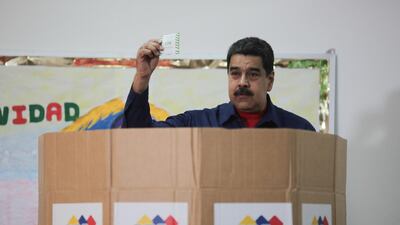Venezuela's leading opposition parties cannot take part in next year's presidential election because they did not take part in Sunday's local voting, President Nicolas Maduro said, in a move set to further consolidate his grip on power.
That includes the groups of Henrique Capriles, Leopoldo Lopez and others, Mr Maduro said after voting.
"That's what the National Constituent Assembly set out," he said, referring to the Maduro-allied special powers legislature.
_______________
Read more:
Venezuela to create a virtual currency backed by oil and gas reserves
Venezuela’s state oil producer tells staff to cut costs by 50%
_______________
The three main opposition parties- Justice First, Popular Will and Democratic Action- said they would boycott the vote to elect mayors, arguing the election was serving Mr Maduro's dictatorship.
President Maduro's ruling Socialist Party is expected to win the most votes in an election that took place in more than 300 towns and cities.
Venezuela, despite having vast oil reserves, has been plunged into economic crisis following the death of Mr Maduro's predecessor Hugo Chavez in 2013.
"If we're going to change the government, we need to do it democratically," said 81-year-old retiree Raul Ocana. "It was a huge mistake (by opposition parties) not to participate."
After the Socialists notched surprise wins in October gubernatorial elections, the government urged supporters to repeat the feat on Sunday to increase the party's current share of roughly 70 percent of mayorships.
"If you want to know what democracy is, come to Venezuela," said a buoyant Maduro, casting his vote in Caracas.
State agencies have pressured voters to participate in elections this year, particularly in the July 30 vote for the all-powerful Constituent Assembly, which the opposition also boycotted.
Some government employees said on Sunday they were being flooded with text messages urging them to show they had voted by posting their ID numbers to state-run websites and to upload pictures of voting centers to social networks.
"They won't leave us alone," said a government ministry employee who requested anonymity. "It's worse than ever."
Opposition activists said the government abused state resources, including bribing people to vote with handouts of food vouchers worth 500,000 bolivars - more than a monthly minimum wage or about $5 (Dh18at the black market wage.
Voting lines observed by Reuters reporters around Venezuela appeared much thinner, however, than at past elections.

